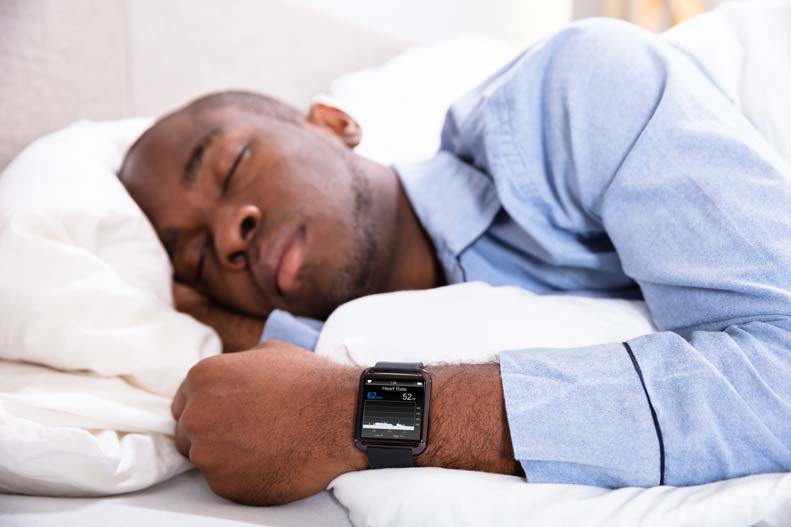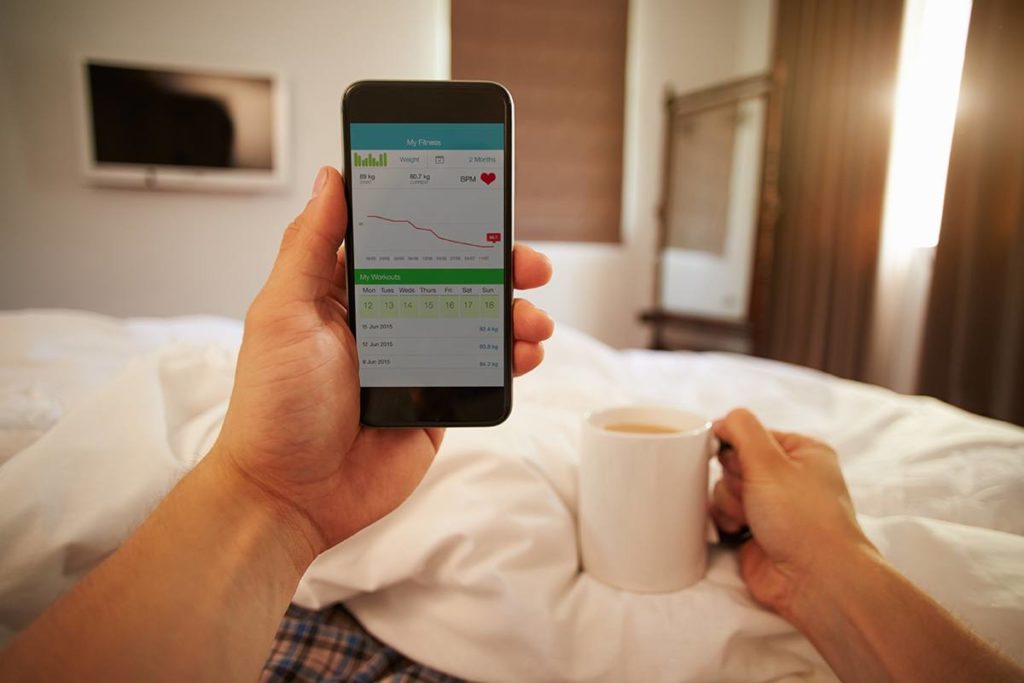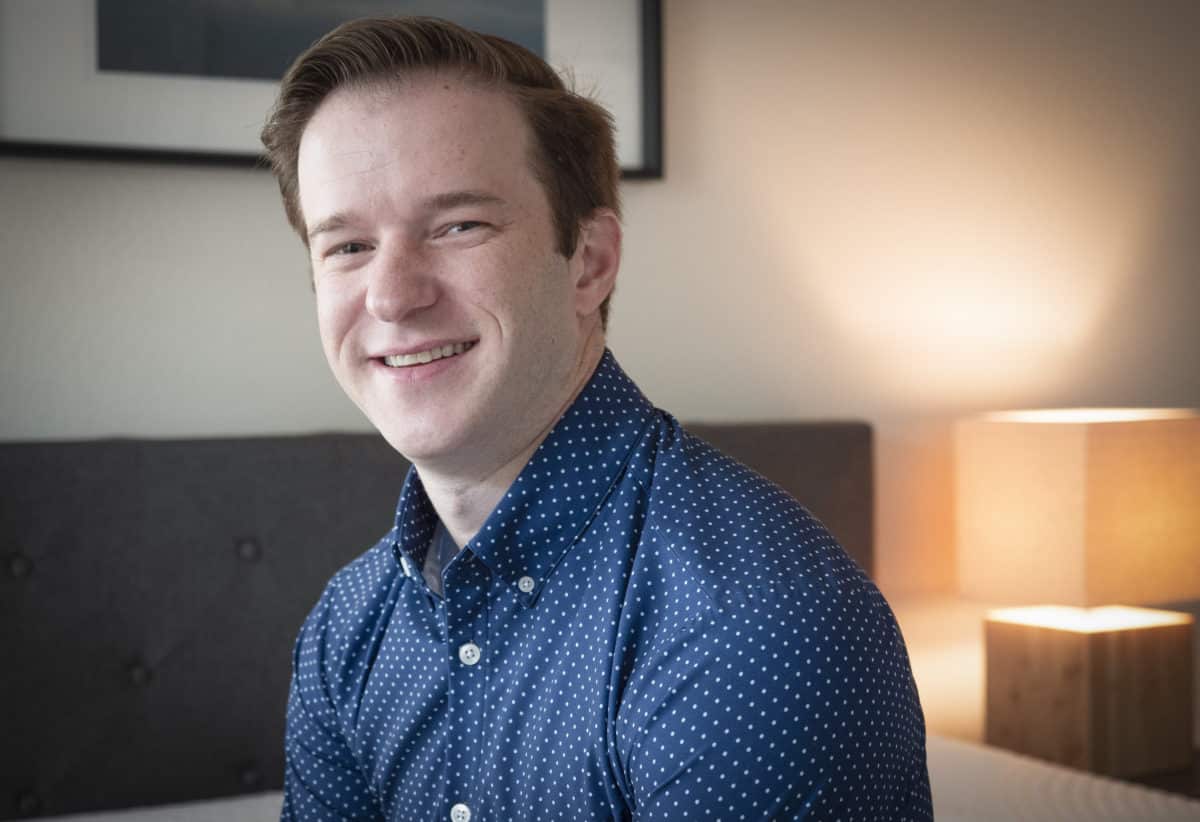We all know that sleep is important. Our bodies and minds cannot function optimally without enough high-quality sleep. But for something so integral to our well-being, ideal sleep can be elusive.
Many people turn to sleep trackers to understand their sleep better. From how much you sleep to whether specific food choices impact your sleep quality, sleep trackers claim to give us insight into this critical part of our lives. But how accurate are sleep trackers?
How Do Sleep Trackers Work?
Sleep trackers work by gathering data and estimating your sleep quantity and quality. The specific types of measurements and estimations vary depending on which sleep tracker you use. In general, sleep trackers measure:
- When you fall asleep and wake up
- How long it takes you to fall asleep
- Nighttime awakenings
Some sleep trackers also claim to track stages of sleep in your sleep cycle. However, according to Northwestern Medicine, the accuracy of sleep-stage tracking outside of a sleep lab is iffy at best.
Sleep Quality Tracking Metrics
While many metrics help sleep trackers gauge your sleep quality, the most common is actigraphy. Particularly useful in wearable trackers, actigraphy measures your body’s movements.
Some sleep trackers also use metrics such as heart rate, body temperature, and respiratory rate. In addition, some sleep trackers utilize self-reported information for a fuller picture of your sleep.
Types of Sleep Trackers
There are many options to choose from when tracking your sleep.
Wearable Sleep Trackers
Wearable sleep trackers are great because they provide a lot of information without much effort, particularly if you already wear the tracker for another purpose, such as fitness. While sleep apps and contactless sleep trackers may pick up motion from a partner or pet, wearable sleep trackers are much less likely to do so.

Various wearable sleep trackers use accelerometers, heart rate sensors and other biometric data to assess your sleep.
Apple Watch
The Apple Watch tracks sleep duration and quality using sensors that detect movement and heart rate. It helps you track and improve your sleep by:
- Providing sleep analysis in your iPhone’s Health app
- Setting a customized sleep schedule
- Offering wind-down features
- Integrating with third-party sleep apps
Fitbit Sleep Tracker
Another popular wearable, the Fitbit Sleep Tracker, also uses heart rate and movement as its primary data sources. In addition, some Fitbit models have an oxygen sensor that enables blood oxygen tracking.
The Fitbit Sleep Tracker:
- Claims to track your light, deep and REM sleep stages
- Provides sleep schedule customization and bedtime reminders
- Calculates a sleep score and provides sleep analysis in the Fitbit app
Oura Ring
If you want a wearable fitness and sleep tracker that doesn’t look like one, then the Oura Ring may be for you. With a sleek design, this tracker fits your finger like a regular ring. The downside to this design is that it cannot provide real-time data via a screen or produce a bedtime alarm.
The Oura Ring:
- Tracks sleep stages using heart rate, body temperature and movement measurements
- Claims to provide information on your sleep efficiency and sleep stages
- Provides a “readiness score” using sleep-quality information
- Offers recommendations for improving sleep
- Provides sleep analysis
Garmin
You may remember Garmin for its GPS technology from the early 2000s. Today, Garmin is a major player in the fitness and sleep-tracking space.
Garmin’s sleep-tracking smartwatches use heart rate and movement to estimate your time asleep and sleep stages. They provide a sleep score, sleep quality metrics and a sleep analysis and trends within the Garmin Connect app.
Whoop
Whoop is unique in that it not only tracks your sleep duration and quality, but it actually calculates how much sleep you need based on various factors. Because it is a fitness tracker, it uses that data to determine whether you need extra recovery time after an intense day. It also uses past sleep data and nap information.
For instance, if you log an hour-long nap, Whoop will subtract that from your sleep need for that night. Alternatively, if you slept poorly last night, Whoop will increase your sleep need for tonight.
Whoop offers two trackers, the Whoop 3.0 and Whoop 4.0. You should wear the Whoop 3.0 on your wrist or bicep, but you can wear the Whoop 4.0 on various parts of your body using Whoop’s sensor-holding clothing items such as:
- Swimsuits
- Intimate wear
- Athletic shorts and pants
- Sports bras
- Tank tops
Non-Wearable or Contactless Sleep Trackers
There are also sleep trackers that are non-wearable or contactless. This is great for people who don’t want to wear a fitness tracker 24/7 or dislike the sensation of wearable trackers.
Contactless sleep trackers reside in different locations. Some lie beneath your pillow or mattress, while others rest on your bedside table. Different trackers have various features, but many claim to integrate heart and respiration rates into your data. The accuracy of this information can vary greatly depending on how the tracker gathers the data and how far away it is from your body during sleep.
The main downside of contactless sleep trackers is that they often pick up data from incorrect sources, such as a sleeping partner or pet. However, if you sleep alone, they are a viable option.
Sleep Apps
There are many sleep apps, varying in price from free to an expensive monthly subscription.
Of course, sleep apps that do not sync with a wearable or contactless sleep tracker have some limitations. They cannot measure biometric data such as heart rate, and movement measurement only works if you always have your phone on you. Also, like contactless sleep trackers, they can easily pick up sounds and movements made by bed partners.
However, sleep apps are valuable and do have many benefits. For instance, if you enable your microphone, sleep apps can provide data regarding snoring and sleep talking. Also, many sleep apps include other benefits, such as soothing sounds to help you fall and stay asleep.
RISE Science Sleep App
The RISE Science Sleep App provides a wealth of analysis about your sleep and energy levels, and is great for people who love diving into data and trends. This app uses motion sensing on your phone to gather data. If you don’t want to always carry your phone on you, you can also pair RISE with certain fitness trackers.
The one thing RISE doesn’t do is keep track of anything while you’re sleeping. RISE specifically focuses on sleep debt (how much sleep you need that you’re not getting) and your daytime energy fluctuations. Because the purpose of RISE is not to tell you about your sleep stages, it doesn’t need the heart rate data that other apps use for this purpose.
ShutEye
ShutEye is a phone app that is especially useful for sleepers who worry about snoring and sleep apnea. It uses noise, as measured through your phone’s mic, to determine respiratory rate, sleep disturbances, and whether you snore.
The app also:
- Records audio while you sleep so you can investigate periods of snoring or other concerns
- Claims to track your sleep cycle
- Provides a sleep quality score and sleep analysis
Of course, if you are concerned about a sleep disorder like sleep apnea, you should consult a medical professional.
How Accurate Are Sleep Trackers?
- Out of 331 sleep tracker-users, 55% of app sleep tracker users and 65% of wearable users felt that their trackers were relatively accurate, according to a recent Mattress Clarity survey.
- Another Mattress Clarity survey found that on average, the 322 respondents that used sleep trackers felt that they got 3.5 nights of poor quality sleep per week, whereas their trackers typically indicated they got an average of 3.8 nights of poor sleep quality. The differences were more significant for app sleep-tracker-users than for wearable sleep-tracker-users.
Sleep tracker manufacturers make numerous claims about what their devices can measure, but how accurate are they in reality? The answer is—it depends.
According to a 2019 study comparing the Fitbit Versa to a wearable EEG, the FitBit was accurate in the following categories:
- Time in bed
- Time asleep
- Sleep efficiency (when calculating it using the above two metrics)
However, Fitbit was inaccurate when measuring things like sleep stages and sleep onset latency, or the time it takes you to fall asleep once in bed.
Alan Schwartz, M.D., director of John Hopkins Sleep Disorders Center at Bayview Medical Center, notes that sleep trackers “don’t measure sleep directly.” Because they are not measuring brain waves, there is no way for a sleep tracker to tell you what sleep phase you are in, for example. However, the information they provide on total time asleep can be helpful.
Alex Stone, DPT, CSCS, states, “The accuracy of wearable sleep trackers can be influenced by several factors, including age, gender, life stage, athletic involvement, and the presence of sleep disorders.” For example, sleep disorders like insomnia, life events like pregnancy or menopause and intense physical activity can all influence sleep patterns affecting the accuracy of sleep tracker data.
Are Sleep Apps Accurate?
Much like sleep trackers, sleep apps are useful but have limitations. One major drawback of standalone smartphone sleep apps is that you need to have your phone on you from the moment you wake up until you go to sleep. This isn’t ideal sleep hygiene, so it could present issues for some.
According to certified personal trainer Hannah Shine, “Sleep apps aim to maintain accuracy by utilizing the sensors available on mobile devices and analyzing the user’s behavior and sleep-related parameters…For more accurate results, it’s advisable to use a combination of reliable sleep-tracking methods.”
In addition, smartphone sleep apps measure whatever is happening near them, whether that relates to you, your sleep partner or your sweetly snoring terrier. Apps that don’t connect to a wearable device are best for solo sleepers.
Can a Fitness Tracker Measure Sleep Accurately?
Fitness trackers measure sleep in the same way as many other sleep trackers, so the same accuracy limitations apply. According to Dr. Zeeshan Afzal, “Most devices use accelerometers to detect movement and estimate sleep stages based on movement patterns.” Dr. Afzal also states a wearable device’s ability to distinguish between sleep stages may be limited compared to a sleep study.
Published sleep expert Jeff Kahn states that wearables tend to do a better job when identifying sleep versus wakefulness, and cannot predict sleep latency or sleep quality as accurately.
The best type of sleep tracker for you depends on what you need to measure. If what you need to know can be derived from motion and heart rate data, then a fitness tracker is a solid choice. On the other hand, if you need something that measures blood oxygen saturation and that’s not a feature of your fitness tracker, then it’s not the right tool for you.
Can a Sleep Tracker Detect a Sleep Disorder?
Many of us struggle with sleep, but what if you think you have a sleep disorder? Can you use your sleep tracker to help diagnose something like insomnia, sleep apnea or parasomnias?
The only thing that can accurately detect a sleep disorder is a polysomnogram, or sleep study. This takes place at a sleep center and involves monitoring various biometric data. A doctor then interprets your results to determine whether you have a sleep disorder. Dr. Afzal says, “Consumer sleep trackers and apps are not diagnostic tools for sleep disorders. While they can provide indicators of irregular sleep patterns, they cannot replace a comprehensive evaluation by a healthcare professional.”
A sleep tracker can, however, let you know that something might be wrong. According to Shine, sleep trackers can highlight changes in sleep duration and breathing patterns which may warrant further investigation. For instance, you can discover that you snore by using a sleep app like ShutEye, and can replay the most active parts of the night to see whether you gasp for air. Similarly, if your sleep tracker tells you that you experience multiple nighttime awakenings, you can follow up with a sleep lab to see what is going on.
What to Do with Sleep Tracker Data: Top Dos and Don’ts
Sleep trackers can be beneficial tools for people looking to become more aware of their sleep habits. However, like any tool, they should only be one part of your overall sleep management.
| DO | DON’T |
|---|---|
| – Use the information as a tool to learn more about your sleep habits. – Take information on things like sleep cycles with a grain of salt. – Figure out what parts of a sleep tracker or app are helpful to you and focus on those. – Continue to listen to your body. Only you know how you feel when you’re rested or exhausted. | – Obsess over minute details. Chances are, they’re not entirely accurate. – Self-diagnose a sleep disorder. Research shows that thinking you could have a sleep problem can be just as detrimental as having one. |
Can You Do a Sleep Study at Home?
Technically, yes, there are sleep studies you can perform at home. However, their usefulness is limited. Portable sleep monitors can help diagnose sleep disorders such as sleep apnea, but most sleep disorders require observation in a sleep lab for proper diagnosis.
Additionally, it’s essential to note that at-home sleep tests do not work for children. A sleep study is necessary to diagnose sleep disorders in a pediatric patient.
When to Consult a Sleep Expert
Sleep trackers are great tools, but they cannot do everything. If you have persistent trouble falling or staying asleep, are excessively tired most days or have concerns about disorders like sleep apnea or narcolepsy, you should consult a sleep expert.
How to Get Better Quality Sleep
It can be stressful to realize you’re not getting enough high-quality sleep, whether you find out from your sleep tracker or otherwise. Thankfully, there are many ways to work towards better sleep.
Firstly, it’s hard to fall asleep if you’re uncomfortable. You want your bed to be an oasis that awaits you at the end of the day, and having a comfortable mattress and pillows is an essential part of making that happen.
However, even the most comfortable bed cannot overcome poor sleep hygiene. From screen time to what you eat in the hours leading up to bed, setting yourself up for successful sleep is important. Check out our blog on How to Fall and Stay Asleep for more information.
And if all else fails, you can check out the newest vacation trend—a sleep retreat.


